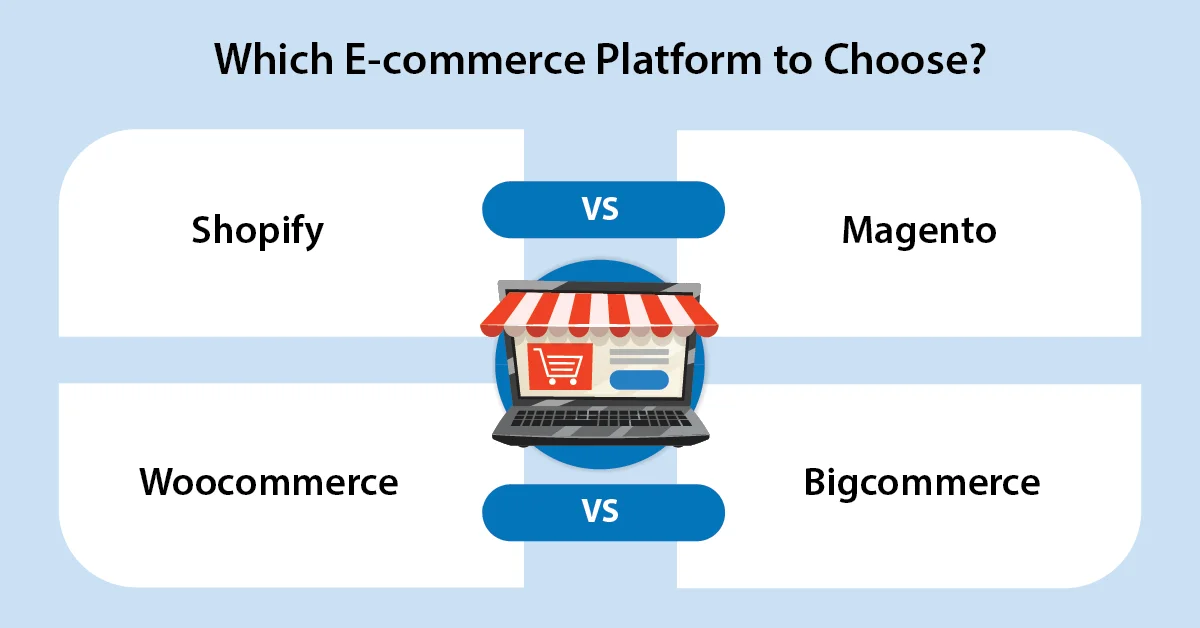Setting up an online store offers businesses a gateway to a global market. However, the ease of entry also emphasizes the importance of choosing the right e-commerce platform. Just like constructing a physical store requires solid groundwork, selecting the right platform is critical to building a robust base for your online business.

The choice of platform impacts various aspects, from cost considerations to customer experience and security. With many platforms available, like Shopify, Magento, WooCommerce, and BigCommerce, learning about their features and functionalities becomes crucial before making a selection.
This Article Contains:
1. Shopify
Major companies using Shopify: Tesla, Red Bull, Kylie Cosmetics, Sephora, PepsiCo (PantryShop), Heinz, Nescafé, Fitbit, Gymshark and Netflix.
Shopify, established in 2006, stands out as a leading ecommerce platform. It is widely embraced by both small businesses and industry giants. Known for its user-friendly interface, Shopify offers two main pricing plans catering to diverse business needs.
Shopify features the Basic Plan, priced at $39 per month, which is tailored for small businesses and individuals. While it provides essential features, it is particularly suitable for those not requiring advanced reporting or additional shipping discounts.
On the other hand, the Advanced Shopify Plan, priced at $399 per month, targets businesses with substantial online and in-person sales. This plan boasts enhanced features, including lower credit card fees, and support for 15 staff accounts.
Pros:
Ease of Use: Shopify is known for its user-friendly interface and straightforward setup, catering to users of all tech proficiency levels with ease.
Customization: Shopify offers diverse themes and customization options, empowering businesses to craft a unique and visually captivating online store that aligns seamlessly with their brand.
Hosting and Security: Shopify prioritizes reliable hosting and robust security features, ensuring a smooth and secure operation of your online store.
SEO and Marketing: With built-in SEO tools and marketing features like discount codes, social media integration, and blog creation, this e-commerce platform aids in boosting your store's visibility and driving sales.
Apps and Plugins: Shopify's extensive app store provides a wide selection of applications, allowing users to add customized features and enhanced functionality to their site effortlessly.
24/7 Support: It has excellent customer service with its 24/7 support, ensuring assistance is readily available whenever you need help, reinforcing its reputation as a reliable ecommerce partner.
Cons:
Pricing: Shopify operates on a subscription-based model, potentially posing a challenge for budget-conscious businesses due to its relatively higher cost.
Transaction Fees: It's important to note that Shopify imposes transaction fees for third-party payment gateways, potentially impacting your profit margins over time.
Email Hosting: Shopify lacks built-in email hosting, requiring an additional solution to effectively manage your email marketing efforts.
Dependency on Third-Party Apps: Shopify's reliance on third-party apps for advanced functionality might be a drawback for those seeking more control over their store's features.
2. Magento
Major companies using Magento: Coca-Cola, Ford, HP, Nike, Asus, Adidas, Converse, Puma, Reebok, Jaguar, and Land Rover.
Magento, founded in 2007, is an e-commerce platform that caters to diverse business needs with its free and paid solutions.
The Magento features an Open Source option, a free solution, that allows users to download, modify, and host their online stores. However, additional investments in themes, extensions, and add-ons are necessary for enhancing store functionality.
Magento Commerce offers two main variations: Magento Commerce and Magento Commerce Cloud (now Adobe Commerce Cloud). The pricing for Magento Commerce is based on annual gross sales revenue (GSR). Magento Commerce Cloud shares a similar pricing structure but is tailored for businesses in need of cloud-based solutions.
This variety in pricing plans allows businesses to choose a Magento solution that aligns with their specific requirements and budget constraints.
Pros:
Flexibility and Customization: Magento provides an array of customization options, particularly well-suited for large e-commerce stores with intricate requirements.
Scalability: Recognized for its scalability, Magento is adept at handling substantial volumes of traffic and orders, making it a reliable choice for businesses experiencing growth.
Rich Feature List: Boasting a diverse array of features and integrations, Magento enables merchants to craft a tailored online store that aligns precisely with their business needs.
SEO-Friendly: Engineered with SEO in mind, this e-commerce platform simplifies the optimization of product pages, facilitating improved search engine rankings for enhanced online visibility.
Omnichannel Support: Magento excels in providing omnichannel support and is particularly effective for mobile, ensuring a seamless and consistent user experience across various channels.
Cons:
High Development Cost: One notable downside of Magento is its elevated development expenses, making it more expensive than user-friendly SaaS platforms like Shopify or BigCommerce.
Complexity: Its setup and usability can pose challenges, demanding technical expertise to fully leverage its features effectively.
Expensive: The licensing fees and hosting costs associated with Magento can be relatively high, potentially making it less economically viable for smaller businesses with budget constraints.
Resource-Intensive: Magento's operation requires substantial server resources, leading to increased hosting costs compared to some other ecommerce platforms.
Maintenance: The upkeep of Magento demands considerable technical resources and time investment. This contributes to higher operational costs that businesses should be prepared for.
3. Woocommerce
Major companies using Woocommerce: The Home Depot, Clickbank, Blue Star Coffee, Phlearn, and Nalgene.
WooCommerce is an e-commerce solution built on the WordPress framework. Launched as a free, open-source plugin, WooCommerce facilitates the creation of online stores on WordPress.
Despite the free plugin, users should be aware of associated costs, including hosting, themes, and extensions.
Payment gateway fees, varying by provider, can include monthly and transaction charges. While WooCommerce features flexibility, businesses need to consider these additional costs when planning their online store budget.
Pros:
Free and Open-Source: WooCommerce is a free and open-source solution that offers accessibility to businesses of varying sizes.
Compatible with WordPress: Designed to seamlessly integrate with WordPress websites, WooCommerce enables easy implementation and management for users familiar with the platform.
Large Community and Support: Boasting a substantial community and an extensive library of plugins and themes, WooCommerce provides businesses with ample resources and support.
Mobile-Friendly: WooCommerce prioritizes a mobile-friendly approach, ensuring a smooth shopping experience for customers using mobile devices.
Cons:
Lack of Built-in SEO Capabilities: Although SEO-friendly, certain backend components of WooCommerce may have technical aspects that could potentially impact SEO negatively.
WordPress-Reliant: As a WordPress plugin, WooCommerce is not an independent e-commerce platform, making it less suitable for businesses that do not use WordPress.
Limited Themes and Extensions: Compared to platforms like Shopify, WooCommerce may have a more restricted selection of themes and extensions, potentially limiting the design and functionality of your online store.
4. Bigcommerce
Major companies using Bigcommerce: Sony, Skullcandy, Ubisoft Store, Razer, Casio, Gillette, and Toyota.
BigCommerce, established in 2009, is an e-commerce platform. It offers a range of pricing plans to meet diverse business needs.
The Standard Plan, priced at $39 per month or $29 per month when paid annually, suits new or small online stores seeking fundamental features.
The Plus Plan, priced at $105 per month or $79 per month annually, targets growing stores aiming to enhance conversions and marketing efforts.
The Pro Plan, at $399 per month or $299 per month annually, caters to high-volume businesses with a high annual revenue, offering advanced features and scalability.
BigCommerce features a custom-priced Enterprise plan for large enterprises. This plan delivers dedicated VIP service and collaboration with the BigCommerce team to implement specific website features.
In essence, BigCommerce's pricing plans are designed to accommodate businesses of various sizes, spanning from small online stores to high-volume enterprises.
Pros:
Scalability: BigCommerce stands out as a scalable solution, adept at accommodating the growth of businesses over time.
Customization: Offering a diverse array of customization options, including themes, plugins, and third-party integrations, BigCommerce empowers businesses to tailor their online presence according to their unique needs.
Robust Security and Uptime: BigCommerce ensures a secure shopping experience with robust security features and consistently high uptime, providing a reliable platform for customers.
Integration with Popular Tools: BigCommerce seamlessly integrates with popular tools such as Mailchimp and Abandoned Cart Recovery, enhancing the overall functionality of the platform.
Multi-store Feature: The multi-store feature of BigCommerce allows businesses to efficiently manage multiple online stores from a single, centralized dashboard.
Cons:
Limited Transaction Volume: Businesses using BigCommerce should be aware of potential limitations on the number of transactions per month, with the necessity to upgrade to a higher-priced plan if exceeding this limit.
Limited Free Themes: While offering free themes, some users may find them to be relatively similar to each other, and the selection of available font types may be somewhat limited.
Monthly Fees: BigCommerce provides a range of pricing plans, but businesses should be mindful that some may find the monthly fees comparatively higher than those of other e-commerce platforms.
Which E-commerce Platform Is the Right One for Your Business?
Deciding on the best ecommerce platform involves considering various factors aligned with your business goals. Here, we'll compare these platforms based on criteria relevant to many e-commerce businesses.
For businesses with budget constraints, WooCommerce stands out as a cost-effective option due to its free and open-source nature. If you seek more control over features and have complex requirements, Magento's extensive customization options make it a suitable choice.
For small to medium-sized businesses seeking a straightforward and cost-effective solution, WooCommerce is a great choice. If you operate a larger business with intricate requirements and are open to investing more in advanced features, Magento might be the preferred option, despite being a bit more challenging to learn.
Shopify and WooCommerce are both SEO-friendly, but they take different approaches. Shopify is user-friendly and automates technical aspects, while WooCommerce, as a WordPress plugin, offers more control and customization for SEO. If you value simplicity and automation, go for Shopify. If you want hands-on SEO control, especially with WordPress capabilities, WooCommerce might be the better choice.
However, businesses may often prefer Shopify over WooCommerce because it's user-friendly, includes hosting and security features, offers more built-in features and templates, better sales tools, scalability, reliability, customer support, SEO capabilities, cost-effectiveness, and a wide range of integrations and add-ons.
If you already have a WordPress website and want more control, WooCommerce is a solid choice. BigCommerce, on the other hand, works well for those seeking an all-in-one ecommerce solution with extra built-in features and design choices. Your decision hinges on your technical skills, budget, and personal preferences.
Deciding between BigCommerce and Shopify boils down to your unique needs. BigCommerce is ideal for expanding businesses, offering scalability and built-in features. Shopify, with its user-friendly interface and extensive app options, is perfect for beginners and those valuing customization. Consider your business size, tech skills, and how much control you want to find the best fit for your goals.
Conclusion
It's advisable to consider factors like ease of use, customer support, and scalability before making a choice. Exploring free trials or demos offered by these platforms can also provide valuable insights.
Whether you’re a small business owner or managing a large enterprise, consider the features and benefits of each platform to find the one that aligns best with your business objectives. Mayura Consultancy Services offers personalized guidance and expert assistance in choosing the right e-commerce platform. Our expertise can steer your business toward success in the dynamic world of online ecommerce. Partner with us to embark on a digital journey that propels your business to new heights.
FAQs
1. What are the pros and cons of using an open-source platform like WooCommerce or Magento?
Businesses that want a quick and cost-effective e-commerce solution may find open-source ecommerce platforms a good fit. However, they have limited functionality, scalability, and customization options. Besides, they may have security limitations.
2. Which platform offers the best customer support?
Shopify and BigCommerce both offer 24/7 customer support, with a range of options including phone, email, and live chat.
3. Which platform offers the best SEO capabilities?
Shopify is solid for SEO as far as e-commerce platforms go.






